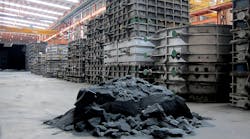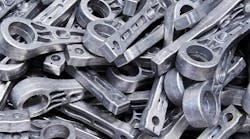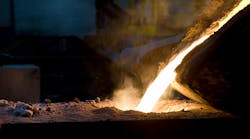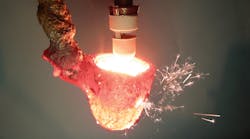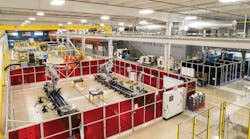The federal Occupational Safety and Health Administration (OSHA) has cited a New Hampshire metalcaster for a series of workplace health and safety violations. OSHA states that Franklin Non-Ferrous Foundry Inc. faces a total of $254,000 in fines for 17 alleged willful and serious violations found during comprehensive OSHA inspections that began in April of this year.
Franklin Non-Ferrous Foundry, in Franklin, NH, is casts brass, bronze, and aluminum alloys into products ranging from 4 oz. up to 230 lb (for bronze ; up to / 80 lb for aluminum.)
OSHA’s New Hampshire area director Rosemarie Ohar said the foundry’s most serious violations involve “inadequate or absent protections for workers whose duties expose them to airborne concentrations of lead."
She recounted the various health hazards relating to lead exposure, including serious damage to circulatory, nervous, urinary, and reproductive systems. “This reality makes it imperative that employers monitor their workers' lead-exposure levels, provide effective respiratory protection, and promptly remove workers from exposure when necessary," Ohar stated.
OSHA determined that Franklin Non-Ferrous did not provide the biological monitoring that is required for workers exposed to lead in the course of their duties, nor properly fit-test and ensure adequate respiratory protection for them.
The agency also said the foundry did not provide required benefits for a worker who was medically removed from work due to lead overexposure.
According to OSHA, the foundry has been cited several times for similar violations over the past decade. Following the recent inspections, OSHA issued three willful citations with $210,000 in proposed fines. (“Willful” violations are those committed with plain indifference to or intentional disregard for employee safety and health.)
OSHA also cited Franklin Non-Ferrous for 14 serious citations for damaged and lead-contaminated respirators, and an erroneous and outdated lead-compliance program, as well as for various confined space, forklift, machine guarding, and electrical hazards. These citations carry $44,000 in fines, (“Serious” citations involve circumstances that may lead to death or serious physical harm to workers as a result of hazards about which the employer knew or should have known.)
"The sizable fines proposed in this case reflect the fact that this employer well knows these safeguards are required to protect the health of its workers, yet has repeatedly refused to provide them," according to Ohar.
Franklin Non-Ferrous was given15 business days from its receipt of the citations and proposed penalties to comply, participate in an informal conference with the OSHA area director, or contest the citations before the independent Occupational Safety and Health Review Commission.
Latest from Materials
Latest from Materials
Melt/Pour
Modeling Aluminum Oxidation
Feb. 27, 2024
Materials
Quiz: Know the Metals!
Aug. 29, 2023
Issues and Ideas
OSHA Cites Schumann for Blast
Aug. 22, 2023
Melt/Pour
Reducing Alloying, Improving Castability
July 17, 2023
Materials
SinterCast CGI Volume Hits a New High
July 11, 2023
Issues and Ideas
LIFT, DoD Renew Co-Op
May 17, 2023

